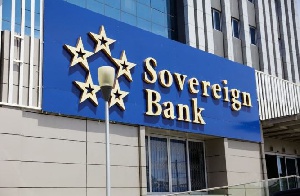The new corporate governance directives announced last month by the Bank of Ghana, which all licensed commercial banks are now required compulsorily to comply with have thrown up the first of what banking industry analysts suspect will be a long list of critical controversies that will afflict the industry over the coming months.
Last week the central bank announced the appointment of an advisor to Sovereign Bank, a move which industry commentators, and consequently the banking public, see as a clear indication that the two year old bank is already in the kind of technical insolvency troubles that led to the revocation of the licenses of both the erstwhile UT Bank and Capital Bank in August last year and the entry into administration of Unibank in March this year.
However, Sovereign Bank chieftains insist that this is not the case and that the appointment of an advisor by the BoG is simply to ensure that the bank complies with the new corporate governance directives.
They admit that the bank has had significant shortcomings so far with regards to compliance but insist that the bank is now coming to terms with the compliance requirements, which indeed will be further facilitated by the newly appointed advisor by the BoG.
Sources at the BoG support this assertion although the central bank has curiously failed to clarify the situation with an official statement so far and this has left the banking public in uncertainty as to whether Sovereign Bank is indeed the latest actor in a rapidly spreading financial virus that is engulfing much of Ghana’s banking industry.
These fears may intensify over the coming months as the BoG considers appointing advisors to other banks that fail to comply significantly with its new corporate governance directives.
If indeed it does so, the banking public will have an excessively withering view of the industry’s financial health which would further erode already weakened confidence in the industry in general.
However, even as some analysts are critical of the central bank for supposedly allowing un-necessary panic to spread among depositors in particular, central bankers are pointing out that the new corporate governance directives have been designed to prevent banks from becoming technically insolvent due to poor corporate governance – translate as poor risk management in the form of imprudent lending, particularly to family, friends and sibling companies – and failure to comply with the directives would ultimately result in insolvency anyway.
Actually, industry analysts suggest that this is a situation already afflicting Sovereign Bank itself; as at early May it has failed to make public its 2017 financials, despite the regulation that requires every bank to do so latest by March 31 of the following year.
Indeed, late release of the previous year’s financial results has in the past tended to be an indication of emergent financial difficulties.
In the face of the uncertainties being thrown up by the BoG’s regulatory intervention in Sovereign Bank and the possibility of similar actions being taken against other banks in similar situation, banking industry analysts and commentators are strongly recommending that the central bank clarifies the rationale for its latest intervention and its policy stance in this regard going forward so the banking public will be able to make well informed decision.
Business News of Friday, 11 May 2018
Source: goldstreetbusiness.com

















